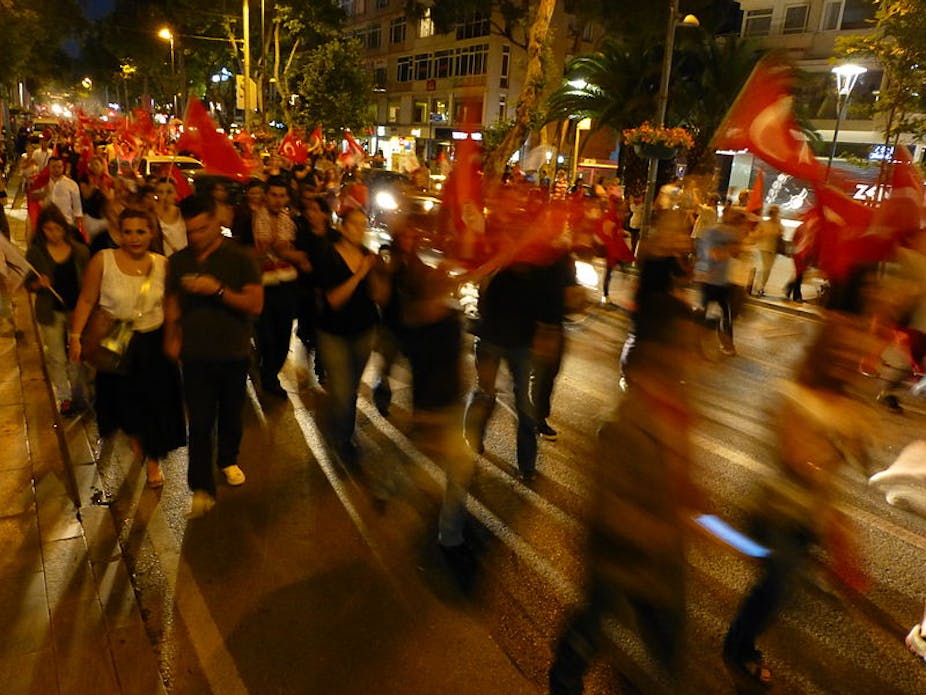Turkey has a stable government that has been popularly elected three times over the past 10 years. The economy is growing and the country is as close to reaching a peaceful solution to its long-running Kurdish problem as it has ever been.
So why the protests of the past fortnight? And who are the protesters? An online poll carried out by a team of researchers at Bilgi University to which 3,000 protesters responded reveal that 64% of the protesters are under the age of 30, 70% do not belong to a political party and 65% describe themselves as secular.
More than half had never taken part in a demonstration before. When asked about what they wanted, 96.1% of the respondents opted for “respect for freedom”, while 92.4% were protesting against “the authoritarian attitude of the prime minister”. Meanwhile some 91.3% said they were against “excessive police force”; 91.1% against “the denial of democratic rights” and 84.2% against “the silence of the Turkish media”. Some 56.2 per cent said they were against “the demolishing of the trees”, which was what nominally sparked the protests in the first place.
Given their age the claim that these are old power groups disgruntled about losing ground in the past 10 years does not appear to have much basis. Moreover, support for a military intervention among the respondents is tiny, again refuting claims that the movement is intended to revive the role of the army, which has been curtailed substantially during the AKP administration.
Rainbow coalition
There is by now ample evidence that protesters came from wide-ranging backgrounds; Greens, revolutionaries, “anti-capitalist Islamists”, liberals, intellectuals and others. A common thread running through all these different elements is the overwhelming demand for “respect for basic freedoms”. They aspire to live in a society which observes the basic tenets of democracy such as freedom of speech, a free press and respect for human rights - things that so many of their counterparts in other countries take for granted.
They want to be the sole determinants of their own lifestyles. They demand not to be seen as “others”, less worthy just because they do not share the common vision of the ruling party.
The irony is that this set of aspirations is very similar to those the AKP professed to hold at the beginning of its reign in 2002. Having been outsiders themselves previously, the AKP had been so determined in its fight against the secular ruling elite, yet only succeeded in replacing it with its own. Successive AKP governments have enacted a series of rules and regulations widening the sphere of influence of those who are the new insiders; “good citizens” who abide by Islamic rules.
Young face uncertain future
The young people who make up the majority of mass protesters today are the new outsiders. A country with 52% of its population under the age of 30; where half of its young people are anxious about their future; where an individual’s life chances are determined by how close he or she is to the ruling party and which side of the ideological divide they happen to be on cannot be a happy place, however well its economy is doing.
There is also plenty of evidence from recent happiness research that economic growth is a necessary but not a sufficient condition for a society’s well-being and contentment. For example, in the United States the reported levels of life satisfaction have barely changed over decades of fast economic progress.
The recently published World Happiness Report suggests that perceived inequalities and social justice are just as important an indicator of happiness or unhappiness. The report also suggests that “insecurity, loss of social trust and declining trust in government” play an important role in determining the happiness of individuals.
The civil movement that has been on display on Turkish streets heralds a new generation who have shown great resourcefulness and humour in turning the protest into a festival of democracy. It poses a stark choice for Turkey’s rulers. They can either choose to embrace all citizens across ethnic, religious, gender and other divides or to rule on the basis of insiders and outsiders.
If Turkey is to have any realistic claim to be an example of democracy for other nations with large Muslim populations it has to opt for the former. It is not just the right thing to do, it is also a precondition for continued economic stability. History reveals that ethnic, religious or social conflict put the brakes on economic progress sooner or later. Turkey does not need to look beyond its borders for examples.

